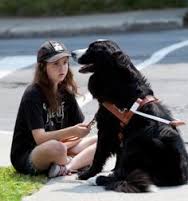While at a friend's house a few weeks ago, a little boy loudly asked his mother, "Is that the one with bwinded eyes?" His mother quietly told him yes, and then quickly tried to distract him with other things. Not to be deterred, he asked me, "How did your eyes get bwinded?" I must admit that I don't have much experience around little children and feel a bit awkward around them no matter what the situation. But I told him openly that my eyes didn't work because I'd been born too early, before they were ready to work. (OK, not completely accurate, but close enough.)
His mother continued to shush him and I felt a little angry at this. I wanted to say (but didn't) "You're teaching your child, right here and now, that blindness is something we shouldn't talk about, something shameful perhaps." I doubt very much that this was her intention, and I can't imagine what it's like to have a young child and be embarrassed about what they're saying or doing, worried that it will offend someone else. But if I could get one message across to parents of young children, it would be:
You know better than anyone how curious your child is, how eager they are to learn. Let them learn; let them ask questions, interact, engage. Please, don't worry about me. There's nothing your child could say that I haven't heard before, and I'm not likely to be offended by a little one who is learning.
About a week after that, I was walking down the street when a little 6-year old girl and her father came up to me. She asked if she could pet my guide dog, Colbert. I stopped, had Colbert sit, and let her pet him. She asked me why my eyes weren't open, and I told her that since they'd never worked, sometimes I just forget to open them. She asked about how Colbert and I did things, and her father told her that we do the same things everyone else does, just sometimes a little differently. She asked why I couldn't see, and I told her I'd been born 3 months early. It turned out that so had she, and that we both weighed 1 pound 11 ounces.
This was a wonderful experience mainly due to her father's open attitude, his willingness to allow her to ask questions, and to take that risk of possibly embarrassing or offending someone. If parents have a general attitude of kindness toward others and sensitivity to the feelings of other people, their children will pick up on this and learn from them. It will be much less likely that a child's comments or actions when they see someone who is different will come from a place of criticism or meanness, and much more likely they will just want to learn!
Love your children, teach them to love, and allow them to engage, connect, and explore that common ground that we as humans all share!
Wynter Pingel works as a braille proofreader at National Braille Press in Boston, MA.

